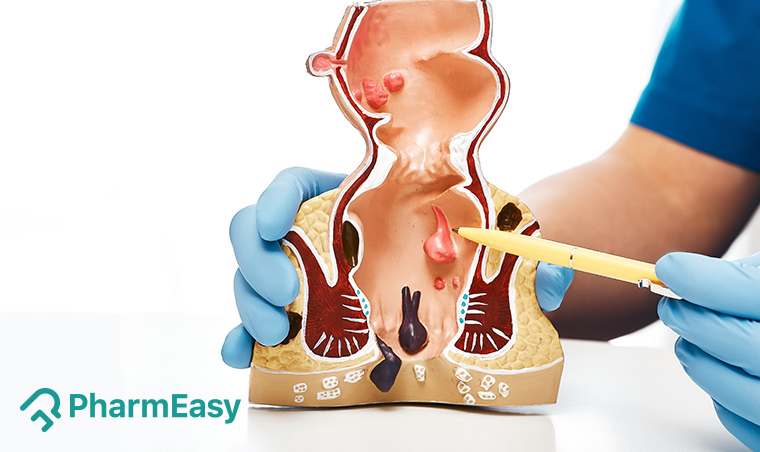Effective Home Remedies For Anal Fissure
By Dr Smita Barode +2 more

Get,

to manage your symptom
Get your,


4 Cr+ families
benefitted

OTP sent to 9988776655



You’ve successfully subscribed to receive
doctor-approved tips on
Whatsapp

Get ready to feel your best.

Hi There,
Download the PharmEasy App now!!


Register to Avail the Offer
Send OTPBy continuing, you agree with our Privacy Policy and Terms and Conditions

Hi There,
Sign up on PharmEasy now!!
Trusted by 4 crore+ families

OTP sent to 9988776655



You have unlocked 25% off on medicines




Code: NU25
By Dr Smita Barode +2 more
Table of Contents
Do you experience pain or bleeding when passing a bowel movement? Or a burning sensation that can last for quite some time? If you answered yes, you might be suffering from an anal fissure. The chances of developing anal fissures decrease with age, especially after 651. However, it is a common problem in children younger than a year as well. Adults may develop anal fissures mainly due to constipation or loose stools. They can affect both men and women, and are particularly common in women after childbirth. Many anal fissures improve on their own without treatment2. But if you feel you may have fissures that are not resolving or are giving you a lot of trouble, reach out to your healthcare provider to get the necessary diagnosis and treatment. You can follow simple home remedies listed below to relieve the symptoms of a fissure and use them for anal fissure self-care.
Anal fissures are a common condition, and doctors can often help manage them with medications and advice. If you experience anal fissure symptoms, don’t delay seeking medical care due to embarrassment, as timely treatment can ease discomfort and support healing.

An anal fissure is a crack or a tear in the lining of the anus, the last portion of the large intestine. Constipation is the most common cause of anal fissure, as the passage of a large or hard stool can tear the anal lining2.
Other causes of an anal fissure include
If you have an anal fissure, you might experience
Symptoms of anal fissures may be similar to those of haemorrhoids, fistula or colo-rectal cancer and, hence, it is crucial to consult a surgeon/proctologist for prompt diagnosis and treatment upon noticing such symptoms. Each condition requires a different treatment approach and relying on home remedies without knowing the diagnosis can worsen the condition.
Dr. Arpit Verma, MBBS MD (Pharmacology)
The remedies mentioned below may help relieve constipation, which will allow the fissure to heal and avoid worsening the condition by eliminating excessive pressure on the area4. Home remedies for fissures include the following.

Regular exercise is an effective self-help tip to manage constipation. You can become more physically active by going out for a walk, yoga, or swimming5. According to WHO6, adults should aim for at least 150 minutes of physical exercise every week and children aged between 5 and 17 years should aim for at least 60 minutes of physical exercise every day.

You should drink plenty of water to help avoid dehydration. Drinking more water will help soften the stool and relieve constipation. This will help alleviate the pain and muscle spasms around the anal region by reducing the pressure on that area4. Try to drink at least eight to 10 glasses of water every day7.

Constipation is the leading cause of anal fissures in adults. You can increase your daily fibre intake to soften the stool and relieve constipation. Eating foods rich in fibre, such as fruits, legumes, vegetables, and whole grains can ease constipation, reduce strain during bowel movements, and support fissure healing4. Adults should consume 25-30 grams of fibre every day8.
Here are examples of foods with high fibre content.

Sitz bath is a warm water soak that helps repair a wound and clean the area. Taking regular Sitz baths can help provide relief from anal fissures. A Sitz bath should be taken with warm water for at least 15 minutes two to three times a day, with only the hips and buttocks submerged in the water2. You can use a bathtub or a Sitz bath kit.

Petroleum jelly is easily available and has a wide range of uses. Applying it on the anal fissure may help soothe irritation in the anal area and provide temporary relief2. It can be used several times a day as needed.
Also Read: Difference between Piles vs Fissure
Don’t let embarrassment or shame stop you from getting the necessary medical help for an anal fissure. A doctor can guide you on self-care measures and provide treatment to relieve your symptoms and reduce the chances of the fissure coming back.
Also Read: Natural Laxatives: Your Guide to Safe and Effective Remedies for Constipation
Anal fissures are painful tears in the anal lining that may bleed when passing stools. Fissure is a common problem, especially in children, although adults can also develop an anal fissure due to constipation. Anal fissures can be uncomfortable, but lifestyle changes and simple self-care measures may help ease the symptoms. Drinking plenty of water and eating high-fibre diet can ease constipation, giving fissures a chance to heal on their own2. If you suspect you have an anal fissure, it is important to seek medical advice and treatment.
Doctors deal with such cases regularly, so there is no need to feel embarrassed about asking for help.
Also Read: How to Stop Itchy Anus at Night: Effective, Research-Backed Solutions
Some remedies that you can follow at home to relieve anal fissures are increasing your fibre and fluid intake, regular exercise, and taking Sitz baths. High fibre intake, increasing hydration and exercising regularly may help you relieve constipation and give the fissure some time to heal on its own. Taking a Sitz bath 2 to 3 times a day will clean the fissure and promote its healing.
Anal fissures, in most cases, usually don’t lead to any serious diseases. However, in some cases, they might lead to an anal fistula (a tunnel is formed between the bowel and the skin near the anal opening), chronic anal fissure (formation of scar tissue at the fissure site) or anal stenosis (anal canal becomes narrowed). It can also lead to submucous abscess or intersphincteric abscess.
Most cases of anal fissures arise due to chronic constipation. The chances of anal fissure may be reduced by eating a lot of fibre, drinking more water and exercising regularly to relieve constipation and improve digestion. Wiping gently every time you use the toilet is also a good practice that can help you avoid anal fissures.
If you notice blood when passing a bowel movement, you should contact your healthcare provider. Also, if the bleeding is accompanied by pain, you need to get medical help and get the necessary diagnosis.
Yes, some anal fissures may heal on their own if you are able to avoid constipation and with proper self-care. Constipation, if not managed, can hinder the healing of fissures because the pressure from the bowel movement constantly damages the fissure site.
Yes, individuals with a previous history of anal fissure are prone to developing it again.
Disclaimer: The information provided here is for educational/awareness purposes only and is not intended to be a substitute for medical treatment by a healthcare professional and should not be relied upon to diagnose or treat any medical condition. The reader should consult a registered medical practitioner to determine the appropriateness of the information and before consuming any medication. PharmEasy does not provide any guarantee or warranty (express or implied) regarding the accuracy, adequacy, completeness, legality, reliability or usefulness of the information; and disclaims any liability arising thereof.
Links and product recommendations in the information provided here are advertisements of third-party products available on the website. PharmEasy does not make any representation on the accuracy or suitability of such products/services. Advertisements do not influence the editorial decisions or content. The information in this blog is subject to change without notice. The authors and administrators reserve the right to modify, add, or remove content without notification. It is your responsibility to review this disclaimer regularly for any changes.
Comments

Leave your comment...
You may also like
Comments